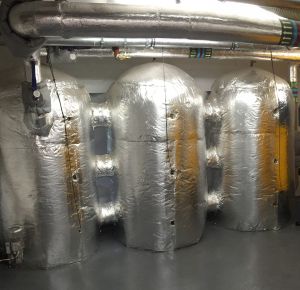Buffer Tanks
Buffer Tank
A buffer tank is almost always required as part of a biomass installation.

Most biomass installations will incorporate a tank containing a large quantity of water which acts as a buffer or accumulator for the heat output from the biomass boiler.
Each boiler manufacturer will have their own recommendation/methodology for sizing this tank, typically expressed as a litres per kW of boiler output, although the design delta T of the heating system (the difference between the flow and return temperatures) also plays a role in the equation used to determine tank size.
Buffer/accumulator tanks play an important role in a biomass installation, including:
- increasing overall system efficiency;
- providing a load for the boiler to ensure good combustion characteristics;
- enabling a system to meet short peaks in demand without oversizing the boiler;
- providing a stored ‘battery’ of heat which is available to the heating system on unexpected start up, i.e. outside normally programmed heating times;
- reducing flue emissions.
The grade of insulation used on a buffer/accumulator tank is also important to consider, and there are products on the market which have a range of performance characteristics. In normal market conditions, there is a direct correlation between the cost of a tank and its thermal performance, and generally speaking, a better insulated and performing tank will deliver higher efficiencies and lower running costs over the life of a scheme, making it a sensible design choice to select the best performing tank possible.






